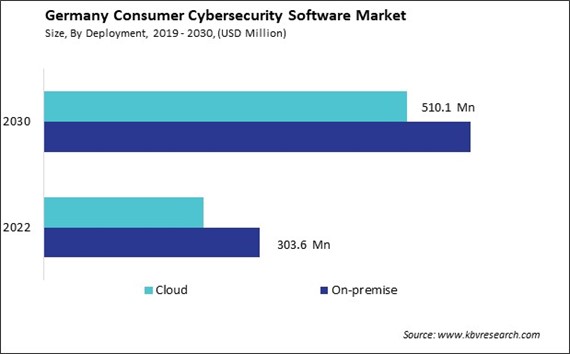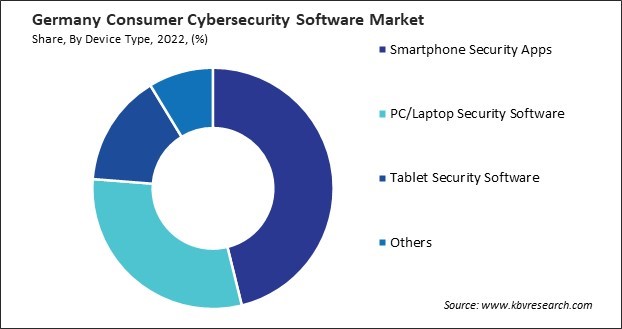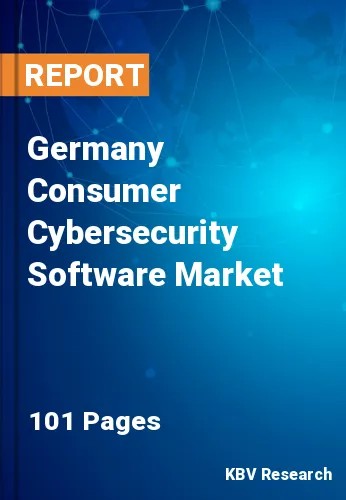The Germany Consumer Cybersecurity Software Market size is expected to reach $1.1 billion by 2030, rising at a market growth of 9.9% CAGR during the forecast period.
Germany's consumer cybersecurity software market is a dynamic and rapidly evolving sector driven by the increasing reliance on digital technologies and the growing awareness of cybersecurity threats among individuals. With the proliferation of internet-connected devices and the rise of online activities such as shopping, banking, and socializing, German consumers are becoming more vigilant about protecting their personal information and digital identities. This has fueled the demand for cybersecurity software solutions tailored to the needs of individual users in the German industry.

One of the key factors driving the growth of the consumer cybersecurity software market in Germany is the escalating frequency and sophistication of cyber threats targeting individuals. From malware and phishing attacks to identity theft and ransomware, consumers face many cybersecurity risks that compromise their sensitive data and financial security. As a result, there is a growing recognition among German consumers of the importance of investing in robust cybersecurity software to safeguard their devices and digital assets.
Furthermore, the COVID-19 pandemic has accelerated the adoption of remote work and online activities, increasing reliance on digital platforms and exposing consumers to new cybersecurity challenges. With more people working from home and conducting transactions online, the need for effective cybersecurity solutions has become more pressing than ever. This has driven up the demand for consumer cybersecurity software in Germany as individuals seek to protect themselves against emerging threats in the digital landscape.
Moreover, the regulatory environment in Germany also plays a significant role in shaping the consumer cybersecurity software market. The European Union's General Data Protection Regulation (GDPR), which came into effect in 2018, has imposed stringent requirements on organizations regarding protecting personal data. This has heightened awareness among consumers about the importance of data privacy and security, prompting them to invest in cybersecurity software that complies with GDPR standards.
The consumer cybersecurity software market in Germany is experiencing a significant transformation driven by the rising penetration of smartphones. One of the key drivers behind the rising smartphone penetration in Germany is the growing dependence on mobile technology for various aspects of daily life. From communication and entertainment to banking and shopping, smartphones have become indispensable tools for consumers. This increased reliance, however, also exposes users to a myriad of cybersecurity threats, including malware, phishing attacks, and data breaches.
According to the International Trade Administration, in 2022, smartphone penetration in Germany lies at 82%, with a social media penetration of 53%. This widespread smartphone ownership contributes significantly to the robust e-commerce landscape in the country. With 66% of online transactions completed through smartphones, Germany's burgeoning consumer cybersecurity software market is closely intertwined with this trend of increasing smartphone penetration.
The demand for consumer cybersecurity software has surged in response to these evolving threats. These software solutions offer a range of features designed to protect smartphones from cyber threats, including antivirus and antimalware protection, secure browsing capabilities, and data encryption. Additionally, as German consumers become more aware of the importance of cybersecurity, they are actively seeking out these tools to safeguard their personal information and sensitive data. Furthermore, the advent of 5G technology is expected to accelerate the adoption of smartphones in Germany, presenting both opportunities and challenges for cybersecurity providers.
Moreover, the proliferation of mobile payment platforms and digital wallets has further fueled the adoption of cybersecurity software among smartphone users in Germany. Thus, the surge in smartphone penetration and the increasing reliance on mobile technology in Germany drive significant growth in the consumer cybersecurity software market.
The consumer cybersecurity software market in Germany is witnessing a substantial surge in online transactions, a trend driven by various factors reshaping the digital landscape. One key driver behind the growth of online transactions is the widespread adoption of e-commerce platforms. German consumers are increasingly turning to online shopping for its convenience and accessibility. With more online transactions, there's a heightened need for cybersecurity software to protect sensitive financial information from cyber threats such as data breaches and identity theft.
According to the International Trade Administration, in 2022, the e-commerce industry in Germany experienced robust growth, with total sales estimated at USD 141.2 billion, representing an impressive 11% increase compared to 2021. As the online population in Germany is expected to climb from 62.4 million in 2020 to an estimated 68.4 million by 2025. In 2022, the industry's online presence in Germany soared to a substantial 80%, securing its place as the third highest globally in terms of online industry penetration.
Moreover, the rise of digital banking and mobile payment solutions has further propelled the trend of online transactions in Germany. Consumers increasingly rely on mobile apps and online banking portals to manage their finances, make payments, and transfer funds. While these digital innovations offer unparalleled convenience, they also introduce new security risks, making cybersecurity software indispensable for safeguarding financial transactions against cyberattacks.
Furthermore, the proliferation of Internet of Things (IoT) devices in German households, including smart home appliances and wearable gadgets, has created new entry points for cyber threats. As a result, there's a growing demand for German consumer cybersecurity software capable of safeguarding IoT devices and preserving the privacy and security of personal data. Hence, the surge in online transactions in Germany driven by e-commerce, digital banking, and IoT adoption underscores the critical importance of robust consumer cybersecurity software to protect against evolving cyber threats.

The consumer cybersecurity software market in Germany is characterized by a rapidly growing awareness of online threats and the increasing adoption of digital technologies in everyday life. One prominent player in the German consumer cybersecurity software market is Avira Operations GmbH & Co. KG, headquartered in Tettnang, Germany. Avira is renowned for its antivirus software and security solutions, catering to individual consumers and businesses. Its flagship product, Avira Free Security, offers comprehensive protection against malware, ransomware, phishing, and other online threats. Avira's commitment to user privacy and user-friendly interface has contributed to its popularity among German consumers seeking reliable cybersecurity solutions.
Another significant company in the consumer cybersecurity software market is Kaspersky Lab GmbH, the German subsidiary of the global cybersecurity company Kaspersky Lab. Kaspersky Lab GmbH offers consumers a wide range of cybersecurity products, including Kaspersky Anti-Virus, Kaspersky Internet Security, and Kaspersky Total Security. These products are known for their advanced threat detection capabilities, robust security features, and ease of use, making them popular choices among German consumers concerned about online security.
In addition, several other companies have established a strong presence in the German consumer cybersecurity software market. One such company is G DATA Software AG, headquartered in Bochum, Germany. G DATA is one of the oldest antivirus companies in the world, known for its expertise in developing cutting-edge security solutions. Its consumer products, such as G DATA Antivirus, G DATA Internet Security, and G DATA Total Security, offer comprehensive protection against viruses, malware, and other cyber threats, making them trusted choices among German consumers.
Similarly, Bitdefender GmbH, the German subsidiary of the cybersecurity company Bitdefender, provides a range of consumer cybersecurity products, including Bitdefender Antivirus Plus, Bitdefender Internet Security, and Bitdefender Total Security. These products offer comprehensive protection against malware, phishing, and other online threats, coupled with advanced features such as ransomware protection and secure browsing, to meet the needs of German consumers. Thus, Germany's consumer cybersecurity software market is characterized by a diverse range of companies offering innovative and reliable security solutions to protect individuals against cyber threats.
By Deployment
By Device Type
By Offering
Our team of dedicated experts can provide you with attractive expansion opportunities for your business.

